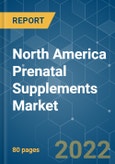The North America prenatal supplements market is forecasted to witness a CAGR of 6.11% during the forecast period (2020 - 2025).
Key Highlights
- The US had by far the highest number of births among developed markets, at some four million a year. Moroever, United States and Canada are one of the two most developed market for pregnancy and baby goods, with average spending remaining high among parents-to-be, and new parents, owing to the the government welfare schemes for pregnant women, higher consumer awareness and professional advice from the doctors, which is driving the North America prenatal supplements market in the North American region and also at a global level.
- Moreover, with the advent of the COVID19, more pregnant women particularly in the United States, are expected to increase the consumption of these supplements, so as to keep their and their baby immunity intact.
- According to the 2018 report by the Centers for Disease Control and Prevention, the U.S. birthrate had also fallen again in 2018, to 3,788,235 births, representing a 2% drop from 2017. It was the lowest number of births in 32 years as per the report. The numbers also sank the U.S. fertility rate to a record low. Therefore this has been the major factor that has been restraining the prenatal supplements market growth in the North American.
Key Market Trends
Increasing Consumption for Dietary Supplements
The U.S. Preventive Services Task Force recommends that women who are planning or capable of pregnancy to take 400-800 micrograms/day of folic acid, and also several health organizations recognize the importance of dietary supplements to meet requirements of specific nutrients. Accordingly, the prevalence of dietary supplement use among pregnant women in United States, is substantially higher than that among the general population.
Yet, a recent report on total usual nutrient intakes (from both foods and supplements) among U.S. pregnant women, from the National Health and Nutrition Examination Survey (NHANES) 2001-2014 concluded that a significant proportion (more than 10%) of pregnant women are not consuming enough of some nutrients (eg, vitamins A, B6, C, D, and E, folate, calcium, iron, magnesium, and zinc), even though 70% reported the use of dietary supplements. Therefore, this factor is increasing the opportunity of sale of dietary supplements further among those 30% of the United States women, who are not consuming dietary supplements in the country
Vitamin Consumption on a Rise among Pregnant Women
Nutrient requirements increase during periods of growth and development, such as pregnancy and lactation, which also increases the consumption of vitamins among the pregnant women . A daily dose of 10ug of vitamin D is recommended throughout pregnancy and breastfeeding.
Moroever, a new study says that the consumption of vitamin C supplements can reduce the baby's risk of developing a wheeze. The results showed an improvement in the lung function of the babies, three months of age, born to women who consumed vitamin C supplements, instead of a placebo. Therefore, benefits such as these, are expected to increase the consumption of prenatal vitamins among the pregnant women.
As more consumers are aiming to obtain their supplemental vitamins through formats other than a pill, most of the women in United States are notably consuming gummies from the companies or brand such as Bayer AG, and Garden of Life.
Competitive Landscape
Both US and Canada have a well-structured and developed healthcare system. These countries also promote research and development for health supplements for expecting mother and hence has very high expenditure on healthcare. As a result of these policies, many companies globally are encouraged to operate in the region. Moreover, many global players have their headquarters in the US, which, makes the market more competitive. Some of the major companies operating in the North America prenatal supplements market are Church & Dwight Co. Inc, Bayer AG, and Procter & Gamble
Additional Benefits:
- The market estimate (ME) sheet in Excel format
- 3 months of analyst support
This product will be delivered within 2 business days.
Table of Contents
Companies Mentioned (Partial List)
A selection of companies mentioned in this report includes, but is not limited to:
- Kikkoman Corporation
- Direct Relief
- Church & Dwight Co. Inc
- Neslte SA
- Procter & Gamble
- Bayer AG
- Otsuka Holdings Co., Ltd.(Nature Made)
- NATURELO Premium Supplements Inc.
- Amway Corp.
Methodology

LOADING...







